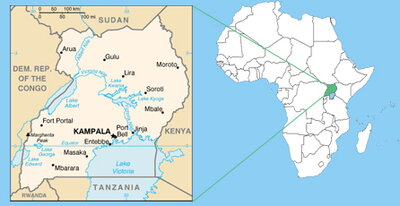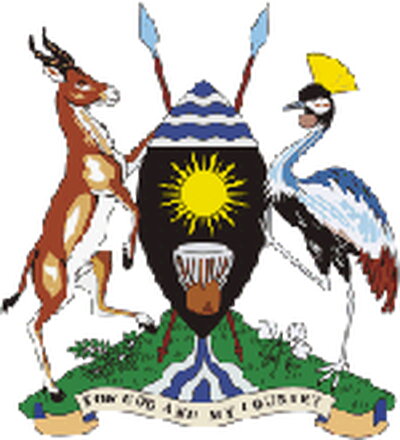

Region: Eastern Africa
Quick Facts:
- Population: 27.6 million
- Capital: Kampala
- Area: 93,072 sq miles (slightly smaller than Oregon)
- Major Languages: English (official), Swahili, Luganda, various Bantu languages
- Life Expectancy: 46 years (men), 47 years (women)
- Literacy: 85.1%
- Monetary unit: 1 Ugandan shilling (UGX) = 100 cents
- Exchange Rate: US $1= 1962 Â UGX (March 17, 2007)
- Income (GDP) per capita: $1363 (constant 2000 international $, WDI 2005)
- Urban population: 13% of total population
- Paved roads: 23% of total road surface
- Electric Power Consumption (per capita): 56 kWH
- Fixed line and mobile phone subscribers: 44 per 1,000 people
- Internet Users: 7 per 1,000 people
- Internet Domain: .ug
- Country Code: +256
- Time Difference: UTC +3 (9 hours ahead of Illinois during Standard Time)
- Climate: Tropical. Hottest month is January (70-85F ), coldest month July (68-74F)
- President: Yoweri Museveni
Historical Background:
The first non-Africans to have ventured into Uganda were Arab traders who moved inland from the Indian Ocean coast of East Africa in the 1830s. They were followed in the 1860s by British explorers searching for the source of the Nile. Protestant missionaries entered the country in 1877, followed by Catholic missionaries in 1879. The United Kingdom placed the area under the charter of the British East Africa Company in 1888, and ruled it as a protectorate from 1894. As several other territories and chiefdoms were integrated, the final protectorate called Uganda took shape in 1914.
Uganda gained independence from Britain in 1962, but the region’s culturally, politically, and linguistically diverse social groups were not easily reconciled into a stable polity. After a series of coups and counter coups the notorious dictator Idi Amin took power in a military coup in 1971. In the sectarian violence wreaked during his rule, some 300,000 Ugandans are estimated to have lost their lives. He also drove out the entrepreneurial Indian community from Uganda thereby harming the economy. His rule ended in 1979 and Uganda has since returned to elected governments.
Socio-political Background:
Ugandan politics is conducted in the framework of a presidential republic whereby the President is the executive head of government. Legislative power is vested in the government and the National Assembly.
Since becoming president in 1986, Yoweri Museveni has implemented democratic reforms and has been credited with improving human rights, particularly by reducing police atrocities.
Despite general political stability in Uganda, The cult-like Lord's Resistance Army has perpetrated massacres and mutilations in the north for nearly two decades, and, according to UN estimates, has abducted 20,000 children. Although, the LRA and the government signed a truce in August 2006 violence continues in some parts of the country.
5.4 percent of the population is estimated to be infected with the HIV virus in 2007 with 77,000 estimated deaths from AIDS, Uganda has won praise for its vigorous campaign against the epidemic. In fact, the prevalence of the virus had reached thirty percent in the 1990s and has been reduced by the government's concerted effort. Although Uganda was wracked by famine in the 1980s, there has been relative stability in this millennium. Malaria and diarrhea remain endemic to the country, although WHO intervention aims to reduce their spread.
Economy:
Uganda has substantial natural resources, including fertile soils and sizable mineral deposits of copper and cobalt. Agriculture is the most important sector of the economy, employing over 80% of the work force, with coffee accounting for the bulk of export revenues. Since 1986, the government (with the support of foreign countries and international agencies) has acted to rehabilitate an economy decimated during the regime of Idi Amin and subsequent civil war.
In the 1990s and through the early years of the new millennium, the Ugandan economy turned in a solid performance based on continued investment in infrastructure, improved incentives for exports, reduced inflation, enhanced domestic security, and the return of exiled Indian-Ugandan entrepreneurs. Ongoing Ugandan involvement in the war in the Democratic Republic of the Congo, corruption within the government, and slippage in the government's determination to press reforms raise doubts about the continuation of strong growth. In 2000, Uganda qualified for the enhanced Heavily Indebted Poor Countries (HIPC) debt relief initiative worth $1.3 billion and Paris Club debt relief worth $145 million. These amounts combined with the original HIPC debt relief added up to about $2 billion. The Ugandan economy grew at a healthy rate in 2001-02 despite continued decline in the price of coffee, Uganda's principal export.
Uganda boasts of a predictable macroeconomic environment with single-digit inflation rates, an average annual economic growth rate of six percent and market driven exchange rates in the last ten years. The Ugandan economy has been liberalized and all sectors are open to foreign investment. A 100 percent foreign ownership of investment is permitted. Uganda also enjoys duty and quota-free access into US (under the Africa Growth and Opportunity Act) and EU markets. Its location at the heart of Sub-Saharan Africa gives investors a commanding base for regional trade and investment. Another advantage of doing business in Uganda is the security of investment as guaranteed under the Constitution and the Investment Code of 1991. It is also covered by the World Bank’s Multilateral Investment Guarantee Agency (MIGA) as well as the US-based Overseas Private Investment Corporation. Export Zones provide a ten year corporate tax holiday, duty exemption on raw materials, plant and machinery, zero export tax, and stamp duty exemption.
Trade Information:
- Exports: $961.7 million (2006 est.)
- Export Goods: Coffee, fish and fish products, tea, cotton, flowers, horticultural products; gold
- Main Export Partners (2005): Belgium (11.4%), Netherlands (11.2%), France (8.2%)
- Imports: $6.602 billion (2006 est.)
- Import Goods: Capital equipment, vehicles, petroleum, medical supplies; cereals
- Main Import Partners (2005): Kenya 34.7%, UAE 8.5%, South Africa 5.7%
Resources for Businesses:
Embassy of the Republic of Uganda, Washington DC
5911 16th Street, NW,
Washington DC 20011
Tel: (202) 726-7100
Fax: (202) 726-1727
Email: info@ugandaembassyus.org

Uganda National Chamber of Commerce and Industry (UNCCI)
Plot 2, Parliament Avenue
First Floor, Jumbo Plaza
P.O. Box 3809 Kampala
Tel: 256 41 503 024/36
Fax: 256 41 503 036
Email: info@ugandachamber.com
Business Opportunities (UNCCI)
Director of External Trade
P.O. Box 30430-00100
Telposta Tower
Kenyatta Avenue
Nairobi, Kenya
Tel: (254) 20 315001
Fax: (254) 20 252896
Email: det@tradeandindustry.go.ke
Last updated on 09/23/2009